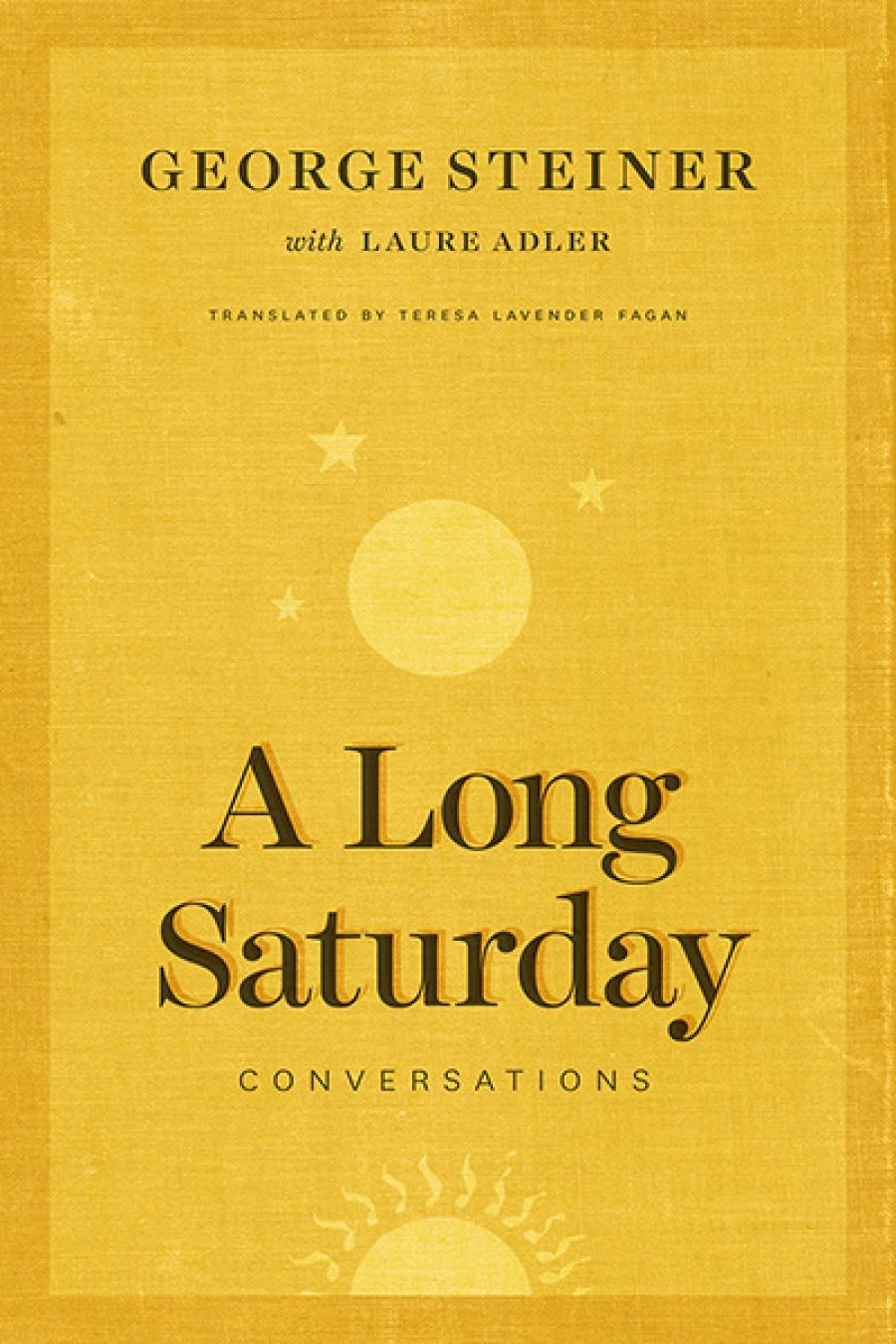
- Free Article: No
- Contents Category: Literary Studies
- Custom Article Title: Andrew Fuhrmann reviews 'A Long Saturday: Conversations' by George Steiner and Laure Adler
- Custom Highlight Text:
In the late 1950s, when he was a fellow at the Princeton Institute for Advanced Learning, George Steiner overheard the legendary J. Robert Oppenheimer, at that time head of the Institute, dressing down a young physicist outside his door: ‘You are so young,’ boomed the father of the atomic bomb, ‘and you have already done so little!’ The story appears ...
- Book 1 Title: A Long Saturday
- Book 1 Subtitle: Conversations
- Book 1 Biblio: University of Chicago Press (Footprint), $44.99 hb, 144 pp, 9780226350387
This is the severest sort of credo – achievement or suicide – and may explain why at the age of eighty-eight the prolific Steiner is still reading and writing and planning new books. It is the only way to resist what he calls the urgency of death, the inevitability of non-being.
Steiner was born in 1929 to Viennese Jewish parents. The family left Europe for the United States in 1940, securing passage on the last American passenger ship to leave Paris before the Nazi invasion. Once in the States, the young Steiner flourished. He went to the University of Chicago and then Harvard. He managed to win a Rhodes Scholarship despite having no talent for any sport except chess. After completing his doctorate at Oxford, he briefly returned to the United States to study at Princeton, but eventually settled in Cambridge, where he was elected an extraordinary fellow in 1969. And in Cambridge he has remained, although he still talks passionately about the virtues of statelessness and transnational mobility. ‘A tree has roots,’ he tells Adler. ‘I have legs. And that’s a magnificent advance.’
There is, too, something of the dedicated stroller in his approach to literary criticism. He is not a great systematic thinker or enquirer after foundations. His range of interests is broad and his touch is light. There are themes and ideas and writers he returns to – translation, the Shoah, Paul Celan, silence, tragedy, Heidegger – but he never gives the impression of claiming exclusive rights. He is always passing through, not trying to manage or enclose or control. In his own terms, he is a kind of literary postal service: ‘All my life I’ve tried to be a good mailman, to take letters and put them in the right mailboxes. It’s not always easy to find the right mailbox if you’re talking about a piece of writing, introducing a new work. You can sometimes be terribly wrong, but it’s a fascinating task, and an important one. I’m lucky to have served as a postino for some very fine writers.’
This analogy is appealing because Steiner’s criticism does sometimes feel like a series of dazzling but discrete parcels. What is remembered about his first book, Tolstoy or Dostoyevsky, published in 1959 and partly written while at Princeton, is not its attempt to align all categories of thought and feeling with the pattern of one or other of the two Russians; what endures is his energetic demonstration of the profound influence of dramatic literature on Dostoevsky’s artistic sensibility. As in so many of Steiner’s books, it is not the grand thesis that impresses but the sparkling sidenote: the virtuoso reading or unexpected comparison.
 George Steiner
George Steiner
The knock on Steiner used to be that he cuts corners, camouflaging ignorance with plausible eloquence and demonstrations of trilingual fluency in English, French, and German. One thinks, for instance, of John Simon’s demolition job on Steiner’s The Death of Tragedy for The Hudson Review in 1961, in which he gleefully holds aloft Steiner’s every slip and distortion. Simon’s performance – and he has given several encores over the years – is the tearing down of a pretentious educator who sets himself up as an encyclopedia of world literature. Fair enough, but Steiner is not read only because he is conspicuously erudite. He is read – and admired – because he is a stylish and persuasive advocate for works in different languages, difficult works, and works that confront difficult but important subjects. Still, having his mistakes so loudly proclaimed must have hurt. And yet, in his conversations with Laure Adler he laments that there is so much ‘bluffing’ in the humanities. In the sciences, he says, they do not tolerate it: ‘You can’t cheat. Anyone who dares to cheat in an experiment, in a result, in a theorem, is destroyed.’ Perhaps we are all fortunate that the humanities are more forgiving.
More recently, critics like James Wood have accused Steiner of a different sort of cheating – of excessive reverence for ‘greatness’. According to Wood – for whom there is no literary magic that cannot be sluiced away with explanation – Steiner too often substitutes rhetorical veneration of the mystery of genius for the grunt work of defining, explaining and clarifying. And it is true that even in this slim volume Steiner manages to use the word ‘miracle’ some twenty odd times. Books are miracles. Records are miracles. China is not a miracle, but India might be. Valéry’s La Jeune Parque is a miracle. The survival of Europe is a miracle.
But for Steiner, what is important is not how literature works but that it works at all. Critics do not need to rationalise the transformative potential of art; they only need to give it ‘a more precise authority and presence’. After all, you don’t want your postman opening the packages as well as delivering them.


Comments powered by CComment